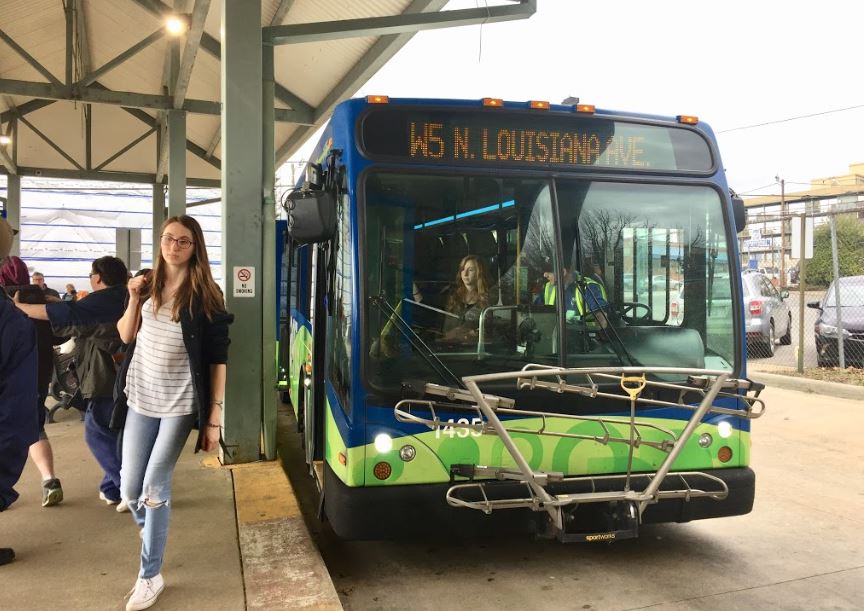Advocates for extending the hours that Asheville’s buses circulate the city will likely have to wait until at least July for the longer service to be implemented, Assistant Director of Transportation Jessica Morriss told Asheville City Council members during their Oct. 22 meeting.
According to Morriss’ presentation, Asheville is preparing to partially implement the first year of changes listed in the Transit Master Plan, which Council adopted in July 2018. The city’s fiscal year 2019-20 operating budget allocated $1.2 million to support the plan, which was originally scheduled to take effect last July. The funded changes, now on track to launch Sunday, Jan. 5, include increased frequency and realignment of existing routes, a bus maintenance facility study and six new staff members.
The current transit budget falls short, however, of the estimated $3.7 million needed for full implementation of the plan’s first year. That funding level would allow the city to extend the hours of all bus routes until 10 p.m. Monday-Saturday and 8 p.m. on Sunday, adding approximately two hours per day to the existing service times.
“We know that that’s critically important to the community,” City Manager Debra Campbell told Council members. “We would love to extend the hours; however, we don’t have the funding as of yet.”
And while the next operating budget cycle, which begins on Wednesday, July 1, could include some funding for the expanded hours, Morriss said that meeting a July deadline for service extension seems unlikely to city staff.
“If we were to try to start the next extension in July, it would be challenging for staff logistically, because it would be coming on the heels of the January one,” Morriss added. “[It’s] not impossible, but I think that, as Debra mentioned, the revenue piece of this puzzle is something that we’re waiting for and will be waiting for a few months.”
That piece has long eluded transit advocates and government officials, who have suggested everything from raising property taxes to cutting funds for other budgetary items, particularly policing. Mayor Esther Manheimer, with the agreement of Council member Vijay Kapoor, said that a countywide quarter-cent sales tax would be the “most efficient way” for the city to secure a revenue stream dedicated to expanding transit and pointed to other counties, such as Wake and Durham, that have successfully implemented such taxes.
“We’re right on the cusp of a county that might be able to do it,” Manheimer said. “I’m a little more optimistic that our county might support a referendum like this, but I still think that we need to have a conversation with our county partners about why this might be an option or why we could consider it.”
Vicki Meath, executive director of Just Economics and representative of the Better Buses Together campaign, suggested during public comment that the city could fund the transit expansion with new property taxes resulting from the sale of nonprofit Mission Health to the for-profit, Nashville-based Hospital Corporation of America. Officials estimate that transaction will generate approximately $5 million in annual tax revenues starting in fiscal year 2020-21.
“We have not dismissed the quarter-cent sales tax. … The reality is that that won’t come about for years,” Meath said. “[The sale of Mission Health] is a once-in-a-lifetime opportunity when we’re getting an increase of revenue at a local level without raising taxes on the individual taxpayer.”
Council considered using the Mission property taxes to fund city transit during its March annual retreat, but members dropped the notion after revenue estimates were revised later that month to be $3 million lower per year than the original projections.
Morriss said that the city’s next steps include finalizing budget estimates for the costs of extending bus service hours; those findings will be presented to Council in December. She added that staff members will also monitor the city’s overall budget for other sources of funding.
“We’re only 2 ½ months into this fiscal year, so we will continue to look at not only the transit budget but the city budget as a whole to see if there are any savings that might be available to extend the hours,” Morriss said





This “change of plans” is hardly a change…it’s the same continuous plan presented differently.
Airlines, trains and private bus systems change schedules frequently, often monthly.
Only in government is it somehow acceptable to say “we did a change in January it would be too hard to do another one in July”.
What a complete joke of a response.
Just imagine if they had control of say your health care or energy. That’s what these people who support government control won’t ponder or even accept as a possibility.
They are in fact showing you and I and everyone else what government will bring to everything they want to takeover. or already control.
instead of running so many big busses with one or two people on them, how about contracting with Mountain Mobility to help move people? busses running on top of each other in west avl…